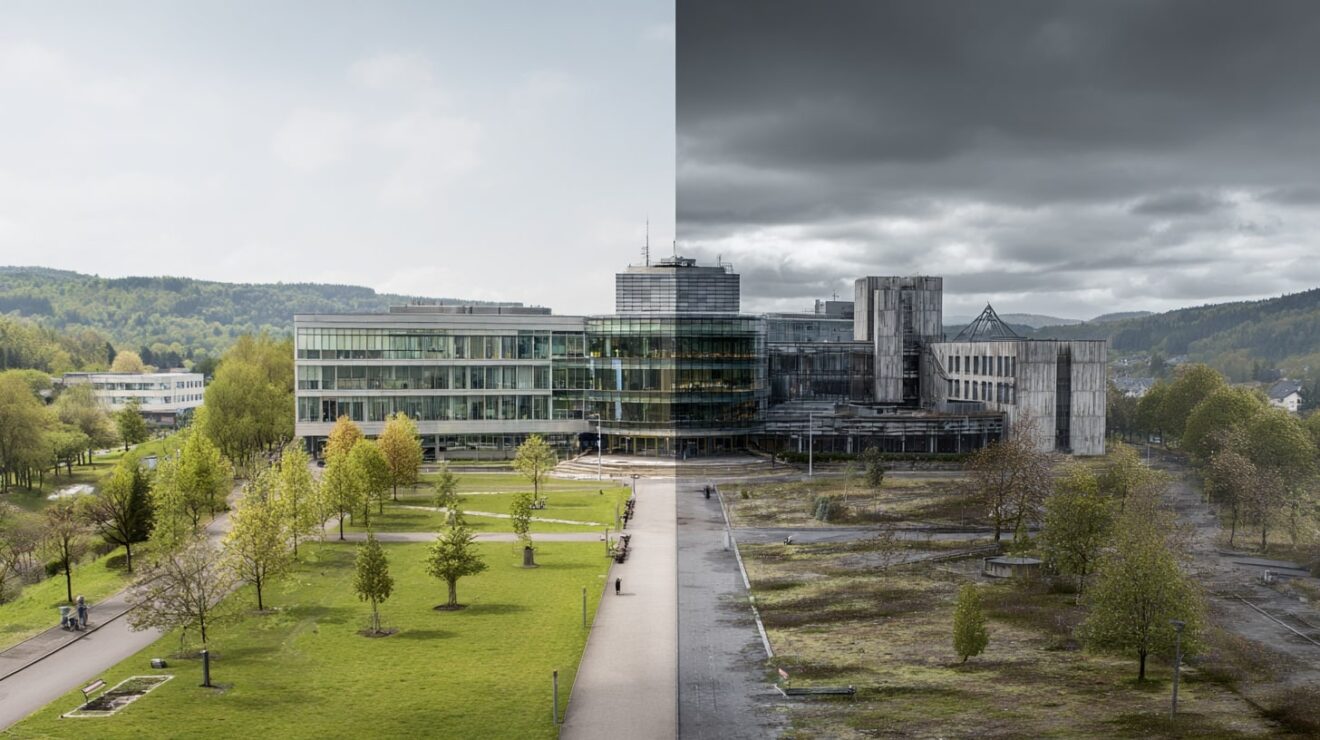There is this nagging allure to how we involve students with the civic fabrics into which their university education is woven: a persistent sense that we could achieve so much by engineering – to borrow language from social enterprise – a kind of “dual bottom line” which couples social good with educational gain.
Sector-wide investigations have alluded to its potential (see the Civic University Network, and the Student Futures Manifesto); it is echoed in many university strategies. It manifests in innumerable initiatives and projects – a cross-section of which have been surfaced in the recent report by the National Coordinating Centre for Public Engagement with the University of Westminster. This demonstrated the plethora of practices to involve students in learning in community settings, sometimes termed “service learning” but with a host of other names including community-engaged learning, live projects, real-world learning, and civic engagement.
But while there is consensus around the value of this service learning, there is ambiguity in how it should best be realised – and delivery at scale is notably absent. Brilliant schemes and initiatives often struggle against institutional inertia and conventions, or their own internal complexities – and service learning is rarely anything but marginal in the totality of institutional provision. Where, elsewhere in the world, service learning is more institutionalised, there remain key concerns around the value to communities, especially where scale is achieved.
How can we resolve this mismatch of ideal and delivery? I think there is an inherent tragedy that the brilliantly multidimensional potential of the work is often its undoing. It seems to speak at once to lifting student employability, while building out satisfaction and belonging; mobilising research impact and engagement; contributing to our civic responsibilities, senses of place and connection to communities.
The tension is this brings ambiguity of purpose, which can sit uncomfortably across institutional strategies which prefer discrete priorities. Genuinely exciting work can fail to find its “Medici” patron and, at worst, can be perceived as un-strategic noise. This is often reciprocated by an impulse to “over-justify”: hyperbolising about manifold potential in ways that can rarely be delivered. We end up with a watered-down impact, spread too thinly across multiple drivers.
This self-perpetuating dysfunctional relationship needs to be undone at the level of institutional strategy and governance. We need to be more pragmatic in our expectations of “value” – transmitting confidence that in aggregate this kind of work is very likely to deliver across all these priorities – but establishing justificatory frameworks for our staff that allows them to feel safe that any component activity can only realistically be expected to deliver against some of them.
As part of work as the Institute for Experiential and Skills Based Learning we are seeking to help the sector find ways forward, through a broader mission to energise experiential learning. Alongside a focus on work, internationalisation, and disciplinarity, our commission is taking civic engagement as a core theme, exploring how better questions can provoke better answers.
Later in November we’ll be at the “learning to make a difference” symposium co-hosted by the University of Westminster and the National Coordinating Centre for Public Engagement – do sign up to join us and share your insight and practice.
Recognise that support and benefit are really complicated
David Owen, independent consultant
The narratives that surround community-engaged learning lay thick the benefits that our students provide in their service for communities. There is, of course, truth to this – but it is a complex and partial truth. To achieve this impact, there is often a significant hidden investment of labour in supporting and scaffolding students, from academics and support staff, and from partners within those communities themselves.
We need to recognise this dynamic – or else we set our students up to create more noise than good. We also risk outsourcing the “burden” of support onto community partners, whose energies may already be spread thinly. We need to get our own infrastructure in order, accounting fully for the labour needed to make good on our ambitions – but we also need to think carefully about service learning as two-directional. We talk often of “mutual benefits” but perhaps the focus here is in finding and building mutually supportive relationships – embracing that our communities are providing an educational experience, and not just receiving a benefit.
Co-construct intentions with students and communities
Fiona Walsh, Partnership and Development Director, Student Hubs
When exploring challenges in student engagement, staff sometimes point to an apparent “slump” in willingness among students to volunteer, prompted by a range of perceived barriers from apathy and a more instrumental approach to university, through cost-of-living pressures. But many students do feel strongly that they can be of service to the communities they live in and to the causes they feel passionately about. Their biggest barrier is knowing where to start, and the alignment of the institutional proposition. Involving students in a conversation about institutional ambitions and bringing stakeholders from the community and civil sector to the table can be a powerful enabler. It can make sure our work aligns genuine needs and appetites, and that students have the tools they need to succeed and thrive during these activities.
As a social action charity, Student Hubs has seen first hand how transformative these conversations can be. Our One Community Forum Toolkit, developed by Student Hubs with the UPP Foundation, can be a starting point for others on this journey, but what is required is an ethos to involve students and communities at the very heart of our strategy. We must start, continue and end with partnership and collaboration at the centre of our work, as otherwise who are they really serving?
Forge belonging and mattering through service, not just “learning”
Afsana Salik, community organiser
Service learning gives students the opportunity to contextualise pertinent issues from the lecture theatre, but it also provides the opportunity to act alongside communities. This hands-on experience not only enhances students’ leadership skills but also fosters a stronger bond between them, their university, and the local community. It nurtures meaningful relationships and cultivates a sense of ownership and responsibility among students towards their university and community: the essence of a civic university, and the foundations for a deeper sense of belonging and mattering.
I have supported the School of Politics and International Relations at Queen Mary University to achieve these goals by integrating community organising theory into undergraduate modules. Students collaborate with Citizens UK and a diverse group of community leaders, dedicating time and effort to organise and fundraise to support refugee families settling in the community.
Recognise the value/risks of the messiness of real-life contexts
Elena Besussi, The Bartlett School of Planning, University College London
The complexity of a real-life problem sets up a learning experience far richer than a purely theoretical mode of teaching. But it also demands we account for this messiness and imperfect nature. If we overmanage these experiences into benign, well-managed projects, we inadvertently smooth out what are essentially the best bits: the character. But if we are too careless, the opportunities for learning are damaged (and relationships are risked)
Two things in particular bear further attention. The first is that, in such an uncontrolled situation, students may draw entirely the wrong conclusions – for instance, reinforcing existing stereotypes rather than unravelling them. The second is that it erodes some of the safety and certainty for students of “teaching for the assessment” and we should recognise that this will inevitably create some anxieties.
These tensions require thoughtful pedagogy, which creates space for reflection (and ensures it is genuinely critical) and co-design of approaches to build confidence whilst retaining authenticity.
Acknowledge “teaching excellence” in the service learning space
Andy Pitchford, Head of the Centre for Teaching Innovation, University of Westminster
I want to find ways to share the excitement I have always had working with students and external partners; to get past the idea that this kind of work is only for the “real enthusiast,” the “lone wolf” or the “maverick.” There is a real skill to finding ways to help all partners in the enterprise. It can sometimes be tricky, but unlocking this is creative, purposeful and occasionally exhilarating.
As institutions we should be acknowledging the excellence of this form of teaching – if that’s what it is – and helping others to tread the same path. This means developing meaningful professional development and working harder to embed community engaged learning across a whole curriculum. Let’s work together to embrace these pedagogies and to share their benefits, rather than leave them struggling at the margins.
Embrace the community-embeddedness of commuting students
Mark Peace, Professor of Innovation in Education, Manchester Metropolitan University
There is a prevailing tendency to view higher education through a residential lens, and this influences assumptions about service learning. This is particularly present in the notion that our students “volunteer in” communities, amplified against a need to “repair” relationships with those who live around student residences.
If not handled properly, there are complex ethical and political tensions around saviour mythologies / voluntourism. But I also think it misses a trick. Some 40 per cent of our students nationally are not residential. Many of these remain at home, embedded in their communities of origin – paradoxically the same communities on which universities would often love to “have impact.”
Recognising this and finding ways to empower students to create good where they are is potentially a powerful innovation in service learning. Not only would it create a more authentic relationship, but it would transform their relational capitals – far too often problematised by traditional ways of talking about widening participation – into a powerful and valued asset.
Build a more expansive definition of knowledge exchange
Paul Manners, Co-Director of the National Coordinating Centre for Public Engagement
Engagement with the public and with civil society is increasingly animating all areas of academic practice – we are seeing a flowering of participatory and engaged practices across research, knowledge exchange and teaching (many of which draw on long traditions of engaged scholarship and adult learning). The recently completed OFS/Research England programme Engaging Students in Knowledge Exchange demonstrates how policy makers are also increasingly focused on connecting these activities up, and there is a growing demand on universities to address place-based inequalities and inclusion through this kind of practice.
What we are still grappling with as a sector is how to join up this activity to maximise the synergies and efficiencies of working in an integrated “engaged” fashion – and how to do this in ways which minimise the burden on our partners. The strategic leadership required to design inclusive learning and research which maximises value for our students, for partners and for wider society is perhaps the single greatest challenge we currently face as a sector, as we grapple with huge economic pressures and fragile trust and understanding of what the sector is for.
Position service learning as core to the knowledge production mission
Marie Xypaki, Head of Teaching and Learning Development, SOAS
The possibilities of service learning are rarely done full justice by its pedagogies and institutional positionings. We recognise mutual benefits, but these are largely developmental; students might “help” communities and in doing so evidence transferable attributes and skills or contextualise their disciplines. Increasingly, this takes a social justice slant, in the need to equip students to perceive, challenge and address injustices. This is all laudable, but there is something missing in the arms-length nature of these interactions.
Service learning is an act of knowledge production, and as such it deserves a place in the core mission of academia. Realising this brings the potential to let underrepresented voices into the academy, co-producing knowledge outcomes. We need to support students in this by making explicit how they understand how the legacies of coloniality – through racism, patriarchy and capitalism – underpin knowledge in universities. Delivering this would lead to a genuine “learning” from “service,” and a new route into decolonisation which makes knowledge production rather than representation the focus of a social justice argument.
Decolonize civic engagement
Sonia Kumar, Professor of Medical Education and Associate Dean for Community-Engaged Learning at the University of Leeds
Universities across the world share missions of advancing knowledge through education and research, with their civic role often sitting alongside these traditional academic pillars. For civic engagement and its values to be truly embedded within the beating heart of a university, it needs to be a visible theme that cuts across both education and research.
However, another critical deep chasm also exists in current discourses in community engagement, dominated by ideology, cultures, and approaches from the global North, where communities, power and social justice have a nuanced and deep-rooted historical-political lens. To broaden and enrich our understanding and notion of being civic and challenge the risky default of colonial practice within higher education, diverse global perspectives need to be brought front and centre into institutional conversations and strategic direction.
For example, at University of Leeds we are working alongside institutions in the global South to ensure our local civic work is informed by best practices from different knowledge systems, cultures and contexts. To further support us in challenging our belief systems and perspectives, the university has recently launched a Knowledge Equity Network to facilitate such cross-cultural exchange of ideas and differing practices.
As part of the Civics strand of the Institute for Experiential and Skills Based Learning, the University of Westminster and the NCCPE will be hosting an in-person symposium Learning to make a difference on Friday 24 November. Find out more and sign up here. Subscribe to the Institute to stay updated on its work and contribute to its broader activities.














Excellent article and resonates completely with RGUplus an initiative we have introduced at Robert Gordon University, Aberdeen that provides a package of additionality (service teaching) that all students participate in alongside their studies to enable them to be able tackle real world problems and become better global citizens. It is beyond the classroom experiences that sets students out from the rest and with effective engagement with careers service the students cannot just demonstrate their additionality in the workplace they can articulate what extra they bring to it and the world about them too.
Also worth looking at KCLs very long standing commitment to embedding service learning modules into the curriculum and tying them to engaged working in community. That work was scaled cross institutionally several years ago now and it’s very impressive.